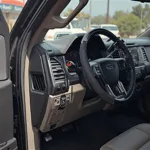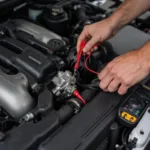Diesel engines, known for their robustness and fuel efficiency, have unique diagnostic needs. While gasoline engines utilize the standard OBD2 (On-Board Diagnostics II) protocol, diesel vehicles have their own set of diagnostic standards that often confuse car owners. This guide explores the diesel OBD2 equivalent, clarifying the different systems and helping you understand how to effectively diagnose issues in your diesel vehicle.
Diesel engines, unlike their gasoline counterparts, rely on different combustion processes and emission control systems. This difference necessitates specific diagnostic protocols beyond the standard OBD2 system for gasoline vehicles. So, what’s the diesel OBD2 equivalent? The answer isn’t a single, unified system. Instead, there are several protocols, depending on the vehicle’s make, model, and year. These include OBD-II for light-duty diesel trucks and SUVs, and heavy-duty protocols like J1939 and J1708 for larger commercial vehicles. Understanding these differences is crucial for proper diagnostics.
Decoding Diesel Diagnostics: Beyond the Basics
Several protocols serve as the diesel OBD2 equivalent. Let’s explore the most common ones:
- OBD-II for Light-Duty Diesels: This is the closest equivalent to the gasoline OBD2 system. Introduced in 1996 for light-duty diesel trucks and SUVs, it provides access to engine and emissions-related data.
- J1939: This protocol is prevalent in heavy-duty vehicles like semi-trucks and buses. It’s a much more complex system capable of monitoring a wider range of vehicle components, including engine, transmission, brakes, and more.
- J1708: An older protocol primarily used in heavy-duty vehicles before J1939 became widespread. While less common in newer vehicles, it’s still relevant for diagnosing older models.
Each protocol offers a different level of diagnostic capability. While OBD-II for light-duty diesels provides basic engine and emissions data, J1939 and J1708 delve deeper into various vehicle systems. Choosing the right diagnostic tool and software becomes crucial for accurately interpreting the data.
Choosing the Right Diagnostic Tools for Diesel Vehicles
Selecting the right diagnostic tool is crucial for effectively troubleshooting diesel engine issues. Several factors influence this choice:
- Vehicle Type: Light-duty diesel trucks and SUVs typically use the standard OBD-II connector and protocols. Heavy-duty vehicles require specialized adapters and software compatible with J1939 or J1708.
- Diagnostic Needs: Are you looking for basic code reading and clearing or more advanced functionalities like live data streaming, bi-directional control, and DPF regeneration?
- Budget: Diagnostic tools range from affordable code readers to high-end professional scanners with extensive features.
Troubleshooting Common Diesel Engine Problems with OBD2 Equivalent Systems
Using the appropriate diagnostic tool, you can troubleshoot a wide range of diesel engine problems, including:
- Emissions System Issues: Diagnosing problems with the DPF (Diesel Particulate Filter), EGR (Exhaust Gas Recirculation) system, and other emissions components.
- Fuel System Problems: Identifying issues with the fuel injectors, fuel pump, and fuel pressure regulator.
- Engine Performance Problems: Diagnosing low power, rough idling, and other performance-related issues.
- Transmission Problems: Troubleshooting issues with automatic transmissions in some diesel vehicles.
John Davis, a seasoned diesel mechanic with over 20 years of experience, emphasizes the importance of using the right tools: “Using a generic OBD2 scanner on a heavy-duty diesel truck won’t give you the complete picture. You need a scanner that can communicate with the J1939 protocol to access all the necessary data.”
Navigating the Future of Diesel Diagnostics
As diesel technology evolves, so too will its diagnostic systems. Emerging trends include:
- Wireless Diagnostics: Connecting to vehicles wirelessly via Bluetooth or Wi-Fi for greater flexibility and convenience.
- Cloud-Based Diagnostics: Storing and analyzing diagnostic data in the cloud for remote access and advanced analytics.
- Predictive Diagnostics: Utilizing machine learning and artificial intelligence to predict potential problems before they occur.
These advancements promise to make diesel diagnostics more efficient, accurate, and accessible than ever before. Staying informed about these developments will be crucial for staying ahead in the ever-changing automotive landscape.
Sarah Miller, an automotive technology consultant, shares her perspective: “The future of diesel diagnostics lies in harnessing the power of data. By leveraging cloud-based platforms and predictive analytics, we can move from reactive maintenance to proactive prevention.”
Conclusion
Understanding the diesel OBD2 equivalent is essential for anyone working with diesel vehicles. By knowing the different protocols and selecting the right diagnostic tools, you can effectively troubleshoot problems, optimize performance, and stay ahead of the curve in the ever-evolving world of diesel technology. Remember to choose your diagnostic tools wisely, considering your specific vehicle and needs. This knowledge will empower you to maintain your diesel vehicle efficiently and effectively.
FAQ
- Is there a single diesel OBD2 equivalent? No, several protocols cater to different types of diesel vehicles, including OBD-II for light-duty vehicles and J1939/J1708 for heavy-duty vehicles.
- Can I use a regular OBD2 scanner on a diesel truck? It depends on the truck. A standard OBD2 scanner will work on light-duty diesel trucks but not on heavy-duty vehicles requiring specialized scanners.
- What is J1939? J1939 is a communication protocol used in heavy-duty vehicles for diagnostics and control.
- What are the benefits of using a diesel-specific scan tool? Diesel-specific scan tools provide access to more data and functionalities than generic OBD2 scanners, allowing for more comprehensive diagnostics.
- What are the future trends in diesel diagnostics? Wireless diagnostics, cloud-based systems, and predictive analytics are shaping the future of diesel diagnostics.
If you are looking for more information on OBD2 scanners, you might find our articles on obd2 supported indian cars and what is equivalent to a zurich zr8 obd2 scanner helpful. Need further assistance? Contact our 24/7 customer support team via WhatsApp: +1(641)206-8880 or Email: cardiagtechworkshop@gmail.com.

